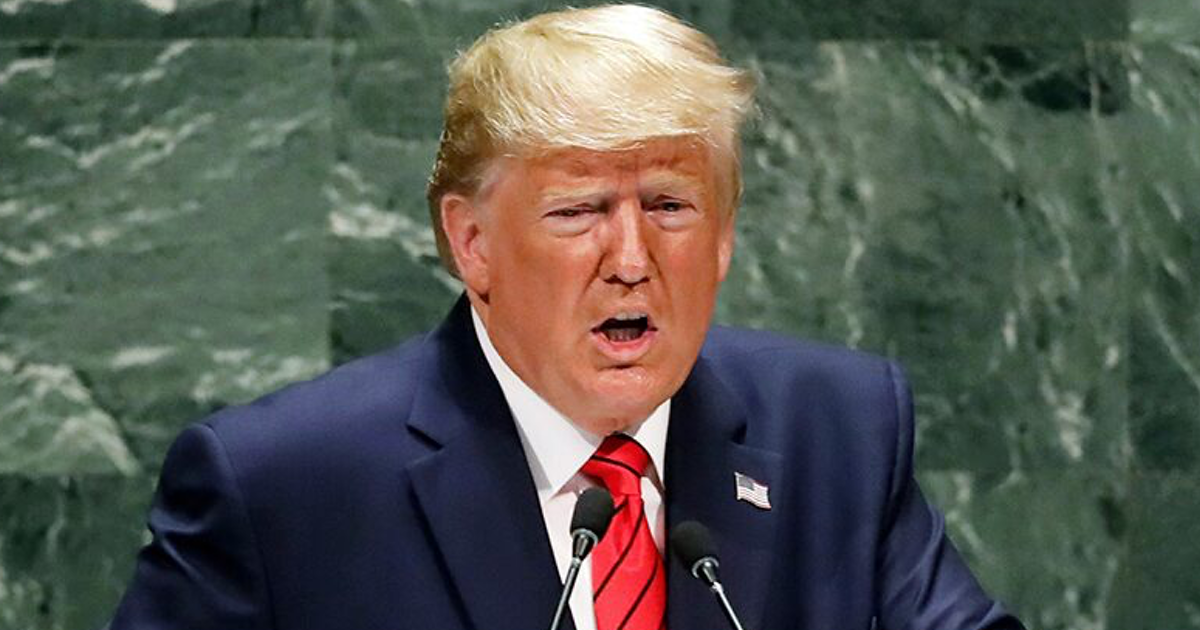Ron Paul on Rand Paul’s introduction of Legislation Blocking the Unique Patient Identifier9/30/2019
By Norm Singleton
Campaign for Liberty Chairman Ron Paul issued the following statement regarding Senator Rand Paul’s introduction of legislation repealing the federal law that authorizes the government to assign every American a Unique Patient Identifier: “Assigning every American a unique patient ID would enable government officials, special interests, and ID thieves to access our private medical records at will. It would also undermine health care by eroding patient’s trust that personal information shared with their physicians will remain confidential.
For more on the unique patient ID see here.
This article was originally published at The Campaign For Liberty.
The Saudi military appears to have suffered an historic defeat with a Houthi trap capturing up to three Saudi brigades. Houthis claim 500 Saudi fighters killed and 2,000 Saudi fighters captured. Houthi footage appears to show Saudi jets bombing long lines of surrendering Saudi forces. Is this latest Saudi loss the end of the road for presumptive heir to the throne, Mohammad bin Salman? Palace coup?
The ruthless jostling for power ... the spiraling of government debt & deficits ... the cascade of failed (yet still endless) wars ... the Fed's money printing ... the promises of FREE everything ... None of it will save the Empire. Liberty is the only way out!
By Liberty Report Staff
While the country is being dragged through the three ring impeachment circus - which is all about politics and nothing about policy, President Trump's secret wars and interventions across the globe continue. Venezuela, Middle East, Lithuania...the intervention is on overdrive. But Congress has no interest in its Constitutional obligations when it comes to war. Political theater is far more exciting...
By Eric Barajas
For almost a century, all U.S. states have enforced compulsory education laws that permit the State to extort parents at gunpoint, taking their money and children away from them to fund and fill indoctrination camps for a third of the day, 5 days a week, 9 months a year, and 12 to 13 years of their children’s formal development. The layperson or the pseudo-intellectual may believe that calling schools “indoctrination camps” seems quite farfetched, and it does until you realize the inherent nature of what schools are. Most schooling options look very similar to each other regardless of whether they are public district schools, public charter schools, or traditional private schools. They all are very reminiscent of the Prussian schooling system, which inspired the U.S. Education System to follow its course in developing a top-down “learning environment” where teachers teach subject matter and content that is predetermined and chosen for them by politicians and higher-up district or network administrators. In this setting, students do not have a say in what they learn about, how they learn it, how they express the understanding of their learning, who they learn with, where they learn, why they learn, and to what extent they learn. Schools create an illusion that the learning of information and concepts is taking place, but that is far from the reality. Within a short period of time, students, on average, tend to forget most of what was covered and “learned”, so what is actually being learned? As the late John Taylor Gatto, an award-winning NY public school teacher, describes in his book “Dumbing Us Down: The Hidden Curriculum of Compulsory Schooling”, the inherent nature of compulsory schooling teaches the following seven lessons: confusion, class position, indifference, emotional dependency, intellectual dependency, provisional self-esteem, and the idea that one cannot hide, which all serve to develop compliance and conformity in students. In schools, confusion takes place in the classroom whereby teachers cover too many different subjects without making any explicit connections between any of them. Gatto states, “I teach the un-relating of everything. I teach disconnections. I teach too much: the orbiting of planets, the law of large numbers, slavery, adjectives, architectural drawing, dance, gymnasium, choral singing, assemblies, surprise guests, fire drills, pull-out programs, guidance with strangers my students may never see again, standardized tests, age-segregation unlike anything seen in the outside world…What do any of these things have to do with each other?” Beyond not explicitly making connections between seemingly different topics, students rarely come to understand the value and utility in learning because nothing ever makes any sense. One does not ever know why they are learning anything, and for this reason, students do not make much meaning of the information or facts they recall. Students do not know why any of it is relevant or important. At best, they remember isolated facts and are able to regurgitate information or vocabulary without having a deep and profound understanding of concepts or ideas. These experiences of confusion suggest to students that “it is better to leave school with a tool kit of superficial jargon derived from economics, sociology, natural science, and so on than with one genuine enthusiasm.” Schools breed, on average, a mediocre jack of all trades, reinforcing compliance and conformity. Throughout students’ educational experience, they also come to understand where they stand in the social and intellectual hierarchy. Gatto describes this lesson as class position wherein a teacher’s job is to “…make them like being locked together with children who bear numbers like their own. Or at least endure it like good sports. If I do my job well, the kids can’t even imagine themselves somewhere else because I’ve shown them how to envy and fear the better classes and how to have contempt for the dumb classes. Under this efficient discipline, the class mostly polices itself into good marching order. That’s the real lesson of any rigged competition like school. You come to know your place.” Here, Gatto touches on two components of class position. The first one is authority. Over the years in school, students recognize their position relative to that of their teacher. The students are submissive to the authoritarian in the classroom, the teacher, who commands the classroom. They learn to behave and accept the commands of the teacher. The other component is archetypes. Over the years, students ascribe themselves to a specific archetype: the smart kid, the average kid, the dumb kid, and others due to the grades and scores they get on assignments and standardized tests, the classes they are put in (e.g., remedial, general education, honors, etc.), and the type of feedback they get. There is never a genuine focus on individual student progress or strengths and abilities. Students learn where they stand in the educational hierarchy and eventually accept their perceived fate, coming to believe that they are not capable of critical thinking. The more students lack confidence in their intellectual capability, the easier it is to have them conform and comply. The first two lessons of schooling cause students to become indifferent about learning and intellectual stimulation. Gatto states that teachers support the lesson of indifference by, “…demanding that [students] become totally involved in my lessons, jumping up and down in their seats with anticipation, competing vigorously with each other for my favor…But when the bell rings, I insist they drop whatever it is we have been doing and proceed quickly to the next work station. They must turn on and off like a light switch. Nothing important is ever finished in my class nor in any class I know of. Students never have a complete experience.” Throughout their schooling experience, students over time start to believe that if what they were doing or learning at school was all that important, they would continue indefinitely until the task or lesson was complete as opposed to ceasing all activities when a bell rings at an arbitrary time. This inevitably creates indifference in students, which breeds nihilism and a sentiment that things in general lack importance or meaning. Students come to an understanding that these things they are learning do not actually matter; students especially believe this when teachers cut lessons short, have students read only parts of a book, or have them skip chapters in a textbook because they are “running out of time”. Gatto also adds that “Years of bells will condition all but the strongest to a world that can no longer offer important work to do. Bells are the secret logic of school time…Bells destroy the past and future, rendering every interval the same as any other.” Bells serve to instill the sentiment of indifference. Just like you train animals with bells through the process of classical conditioning, schools do the same with our children. We are being trained to not truly care for knowledge and learning. We are being trained to be indifferent, which reinforces compliance and conformity. In the classroom, students are not free to make decisions for themselves; all actions must be permitted by the teacher, which serves to develop emotional dependency, the fourth lesson of compulsory schooling. Gatto notes, “By stars and red checks, smiles and frowns, prizes, honors, and disgraces, I teach kids to surrender their will to the predestinated chain of command. Rights may be granted or withheld by any authority without appeal, because rights do not exist inside a school – not even the right of free speech, as the Supreme Court has ruled – unless school authorities say they do. As a schoolteacher, I intervene in many personal decisions, issuing a pass for those I deem legitimate and initiating a disciplinary confrontation for behavior that threatens my control. Individuality is constantly trying to assert itself among children and teenagers, so my judgments come thick and fast. Individuality is a contradiction of class theory, a curse all systems of classification.” Students are subjected to the will of the teacher. Every aspect of each individual’s personhood has to go through the teacher – to get out of their desk, to get a resource, to go to the restroom, to do anything. There is no trust. Students are emotionally dependent on their teacher. The teacher commands the classroom to behave in a uniform fashion and whenever students are out of line, they are reprimanded. The teacher instills fear in the students by threatening them with consequences, driving them to conform and comply to avoid being punished by their parents. Read the rest of this article at The Libertarian Institute.
Just as the Democratic Party was gearing up for a good, old-fashioned impeachment - something they've been desperate for since Trump was elected - the release of the transcript of the phone call between Trump and the Ukraine president has fizzled their hopes. Again. There is no "there" there and again the Democrats and their allies in the mainstream media are left looking foolish.
By Chris Rossini
While President Trump's actions all-too-often go against his words, he did say something quite admirable yesterday at the UN General Assembly. The president said: "the future does not belong to globalists. The future belongs to patriots." It's a nice touch for President Trump to say these words in front of people who literally believe that they can "run the world," or "plan for the world," or "save the world," or any other delusion that they've fastened onto themselves. The world doesn't need "saving," and it surely is not, and will not be "run" by anyone. The world is the natural home for individual human beings, who have the ability to "run" only one thing --- their own individual human lives. This has always been the only reality. But individuals have imaginations. We can imagine that which is not real. We can even believe it. People can envision themselves as high and mighty architects, with blueprints and plans for the entire world. Others can (and do) reinforce the delusions by believing it themselves and by cheering it on. None of it has (or can) ever come to pass. Reality always smacks it down. It doesn't matter if they call themselves "globalists". That only shows how overzealous their imaginations really are. And why stop there? Why not go for the whole galaxy or universe? They can easily call themselves "universalists" with "plans," "legislation," and "resolutions" to organize the whole universe. So what? It doesn't change one iota of truth. Individuals have power to run one life, and one life only -- their own. Discovering the truth, conditioning yourself to live by it, and then reaping the beneficent results is more than sufficient to keep us occupied. The delusion begins when a person convinces himself that he's in charge of even a single life other than his own. The mental disease can then spread from there .... leading all the way to referring to yourself as a "globalist." The past ... The present ... The future ... It always belongs to the individual.
The US House is said to have pushed impeachment of President Trump to the front burner after it has been revealed that he discussed a corruption investigation of Joe Biden's son with the president of Ukraine. Earlier, Biden bragged that he got the prosecutor fired and the investigation was put on ice. Was there a quid pro quo for US military aid? Who was the "whistleblower"? Who is guilty? Both? And what about the foreign aid in the first place?
|
Archives
July 2024
|




 RSS Feed
RSS Feed



